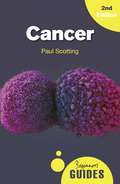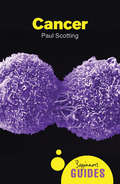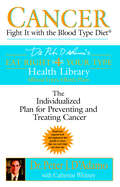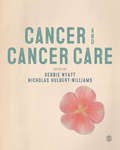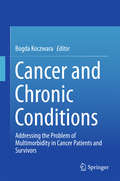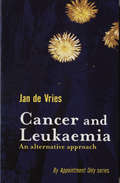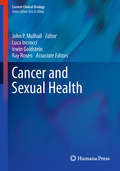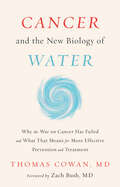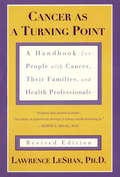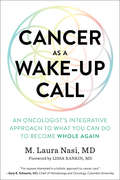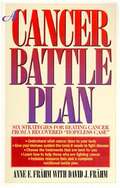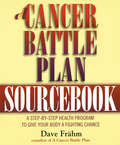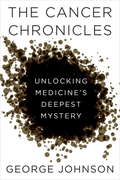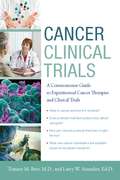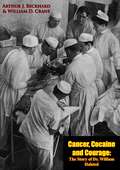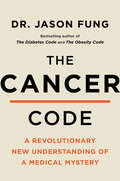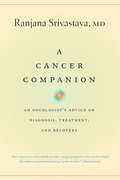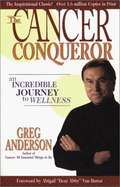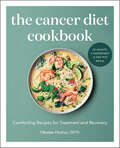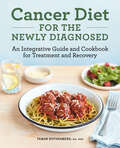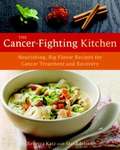- Table View
- List View
Cancer: A Beginner's Guide (Beginner's Guides)
by Paul ScottingCancer is a leading cause of death worldwide, and one of the most feared diagnoses a patient can face. The number of new cases is expected to rise by 70% over the next two decades, but few of us understand what it is, how it affects the body or what can be done to treat and even prevent it. In this illuminating introduction, Dr Paul Scotting explains the science behind the disease and explores the factors that can increase our risk of developing cancer. Fully revised and updated, Cancer: A Beginner&’s Guide details the latest breakthroughs, cutting-edge developments and promising new strategies that will help us combat and cure cancer in the future.
Cancer
by Paul ScottingCancer is the second biggest killer in the world, but few of us understand how it works or how we treat it. In this illuminating introduction, Paul Scotting explains the science behind the disease and explores why some of us are more likely to develop it than others. Arguing that we're in a new age of understanding that will revolutionise the fight against cancer, Scotting discusses cutting-edge developments and maps out the promising future strategies for its prevention, treatment, and cure.
Cancer
by Paul ScottingCancer is the second biggest killer in the world, but few of us understand how it works or how it is treated. In this illuminating introduction, Paul Scotting explains the science behind the disease and explores why some of us are more likely to develop it than others. Arguing that we're in a new age of understanding that will revolutionize the fight againtst cancer, Scotting maps out the promising future strategies for its prevention, treatment, and cure.
Cancer: Fight It with the Blood Type Diet
by Catherine Whitney Dr Peter J. D'AdamoDr. Peter J. D'Adamo has forever changed the strategy for eating right to lose weight and achieving maximum health. Because he discovered what many already instinctively knew-that a plan that works for one person may make another ill-there will never be a one-size-fits-all diet again. And since we now know that each blood type is affected differently by common diseases and conditions, there will never be a one-size-fits-all plan of action. With more than 2 million copies of his books in print, G. P. Putnam's Sons announces the launch of Dr. D'Adamo's Eat Right 4 (for) Your Type Library. Over the next two years, eight books will be published on eight different conditions, the first two being cancer and diabetes. In these books, readers will find new information individualized for their blood type and illness. In addition to the food categories Beneficial, Neutral, and Avoid, Dr. D'Adamo introduces a new category-Superbeneficial-for helping your body fight disease. He also introduces self-assessment tests to determine status and measure progress. Supplement, lifestyle, and exercise protocols are tailored to each blood type and condition. There has never been a better arsenal for fighting disease, and never an easier or clearer tool.
Cancer and Cancer Care
by Debbie Wyatt Nicholas Hulbert-Williams‘This book creates new ground for all health professionals working in cancer care to read, enjoy, look at and question their practice.’ Caroline Adcock, Clinical Practice Educator – Haematology and Oncology, Royal Shrewsbury Hospital Cancer and Cancer Care is a complete study of cancer, the care of people with the disease and its impact on everyday life. Addressing the physical and psychosocial aspects of the illness in detail, it covers all fundamental aspects of cancer diagnosis, treatment, survival and aspects of psychosocial support for all those affected by cancer: patients, their families, and their healthcare providers. Chapters include: - A review of the latest theory and evidence on over 30 separate topic areas - Reflective questions which challenge readers to reappraise what they have learned - Chapter overviews and chapter summaries which highlight the key points The book is essential reading for all those on cancer care courses at undergraduate and postgraduate level. It will be valuable reading for nurses, oncologists, psychologists, social workers and all healthcare practitioners and researchers working with people affected by cancer.
Cancer and Cancer Care
by Debbie Wyatt Nicholas Hulbert-Williams'This book creates new ground for all health professionals working in cancer care to read, enjoy, look at and question their practice.' Caroline Adcock, Clinical Practice Educator - Haematology and Oncology, Royal Shrewsbury Hospital Cancer and Cancer Care is a complete study of cancer, the care of people with the disease and its impact on everyday life. Addressing the physical and psychosocial aspects of the illness in detail, it covers all fundamental aspects of cancer diagnosis, treatment, survival and aspects of psychosocial support for all those affected by cancer: patients, their families, and their healthcare providers. Chapters include: - A review of the latest theory and evidence on over 30 separate topic areas - Reflective questions which challenge readers to reappraise what they have learned - Chapter overviews and chapter summaries which highlight the key points The book is essential reading for all those on cancer care courses at undergraduate and postgraduate level. It will be valuable reading for nurses, oncologists, psychologists, social workers and all healthcare practitioners and researchers working with people affected by cancer.
Cancer and Chronic Conditions: Addressing the Problem of Multimorbidity in Cancer Patients and Survivors
by Bogda KoczwaraThis book addresses the growing problem of multimorbidity in cancer patients and survivors with the focus on how to best integrate the effective cancer care with the care of multiple chronic conditions. As cancer is more prevalent in older individuals, many patients with cancer also suffer from other chronic conditions that impact on the uptake, tolerance and outcomes of cancer treatment and their long term mortality and morbidity. In addition, cancer and its treatment increase the risk of future chronic conditions. Readers will examine the prevalence and predictors of chronic conditions in cancer, impact of chronic conditions on screening and treatment, evidence for preventative strategies that address both cancer and chronic conditions, emerging management and care integration strategies and directions for management of multimorbidity in special cancer populations - the very young, the very old and those at the end of life. Authored by clinicians and researchers from diverse expertise including epidemiology, sociology, hematology, medical oncology, palliative care, pharmacy and representing Australia, New Zealand, US, Canada and the Netherlands, the book brings an international perspective to a problem that affects all cancer settings. The book is going to be of interest to diverse professionals interested in cancer control including epidemiologists, public health researchers, policy makers as well as clinicians dealing with cancer patients within specialist cancer and non-cancer and primary care settings.
Cancer and Leukaemia: An Alternative Approach (By Appointment Only Ser.)
by Jan de VriesWhat are the causes of cancer, and is there a cure for this most devastating of diseases? Why is it that some parts of the world show a dramatic rise in the cancer rate of those under 25? Why is bowel cancer incidence substantially higher in Scotland than in the rest of Britain? And why is the UK incidence of cancer the second highest in the world? These and other vital questions are discussed in Cancer and Leukaemia: An Alternative Approach.
Cancer and Reproductive Health
by Sean Kehoe Eric Jauniaux Pierre Martin-Hirsch Philip SavageWhile cancer affects primarily the elderly, it also occurs in younger age groups, with different implications specifically relating to reproduction. Cancer can also occur during pregnancy itself. This brings together two diverse areas of medicine, encompassing the complexity of cancer and its varied biology and the equally challenging areas of fertility, conception and pregnancy. The 55th RCOG Study Group brought together a range of experts to examine these issues. This book presents the findings of the Study Group, with sections covering: - epidemiology, genetics and basic principles of chemotherapy and radiotherapy - fertility issues and paediatric cancers - gynaecological cancers and precancer - diagnostic dilemmas - the placenta - non-gynaecological cancers - multidisciplinary care and service provision.
Cancer and Sexual Health (Current Clinical Urology)
by Irwin Goldstein John P Mulhall Luca Incrocci Ray RosenThe average physician and even cancer care-givers are not knowledgeable about the effects of cancer treatment on sex and reproductive life. They are even less aware of the options available for treatment of such patients. Cancer and Sexual Health fills a great need for a reference work devoted to the link between cancer and human sexuality. The volume is designed to give a comprehensive and state-of-the-art review of the sexual and reproductive consequences of cancer diagnosis and treatment. It will prove an invaluable resource for those clinicians caring for cancer patients as well as acting as a reference text for the sexual medicine clinician who may not see a large number of cancer patients.
Cancer and the New Biology of Water: Why the War on Cancer Has Failed and What That Means for More Effective Prevention and Treatment
by null Thomas CowanA groundbreaking look at the role of water in living organisms that ultimately brings us closer to answering the riddle of the etiology of, and therapy and treatment for, cancerWhen President Nixon launched the War on Cancer with the signing of the National Cancer Act of 1971 and the allocation of billions of research dollars, it was amidst a flurry of promises that a cure was within reach. The research establishment was trumpeting the discovery of oncogenes, the genes that supposedly cause cancer. As soon as we identified them and treated cancer patients accordingly, cancer would become a thing of the past.Fifty years later it&’s clear that the War on Cancer has failed—despite what the cancer industry wants us to believe. New diagnoses have continued to climb; one in three people in the United States can now expect to battle cancer during their lifetime. For the majority of common cancers, the search for oncogenes has not changed the treatment: We&’re still treating with the same old triad of removing (surgery), burning out (radiation), or poisoning (chemotherapy).In Cancer and the New Biology of Water, Thomas Cowan, MD, argues that this failure was inevitable because the oncogene theory is incorrect—or at least incomplete—and based on a flawed concept of biology in which DNA controls our cellular function and therefore our health. Instead, Dr. Cowan tells us, the somatic mutations seen in cancer cells are the result of a cellular deterioration that has little to do with oncogenes, DNA, or even the nucleus. The root cause is metabolic dysfunction that deteriorates the structured water that forms the basis of cytoplasmic—and therefore, cellular—health.Despite mainstream medicine&’s failure to bring an end to suffering or deliver on its promises, it remains illegal for physicians to prescribe anything other than the &“standard of care&” for their cancer patients—no matter how dangerous and ineffective that standard may be—and despite the fact that gentler, more effective, and more promising treatments exist. While Dr. Cowan acknowledges that all of these treatments need more research, Cancer and the New Biology of Water is an impassioned plea from a long-time physician that these promising treatments merit our attention and research dollars and that patients have the right to information, options, and medical freedom in matters of their own life and death.
Cancer and Vitamin C: A Discussion of the Nature, Causes, Prevention, and Treatment of Cancer with Special Reference to the Value of Vitamin C
by Ewan Cameron Linus PaulingThis book weighs the value and limitations of various modes of treatment: surgery, radiation, chemotherapy, hormones, immunotherapy, and a number of unorthodox therapies, including Laetrile.
Cancer As a Turning Point
by Lawrence LeshanPsychotherapist Lawrence LeShan has worked with cancer patients for more than thirty-five years and his research has led people with cancer to find new, effective ways to fight for their lives. He has put his findings--full of meaning and purpose--into this revised edition that shows how psychological change, along with medical treatment, mobilizes a compromised immune system for healing. Included is a life-transforming workbook of hands-on exercises designed to help readers evaluate their inner selves and teach them how to get the most out of their immune systems by leading fuller, richer lives.
Cancer as a Wake-Up Call: An Oncologist's Integrative Approach to What You Can Do to Become Whole Again
by M. Laura Nasi Lissa RankinAn oncologist’s integrative path to treating and living better with or beyond cancer Dr. M. Laura Nasi presents a new way of looking at how we view and treat cancer. With current advances in medicine, we’re learning more about the ways different aspects of our lives and health impact and interact with one another—why does one long-term smoker get diagnosed with stage-4 lung cancer while another remains cancer-free? Why does someone exposed to a known carcinogen get sick while someone else is apparently immune? What seemingly unrelated factors end up playing key roles in disease etiology, progression, and prognosis? In this well-researched, inspiring, and easy-to-read guide, Dr. Nasi offers an integrative, whole-person approach to cancer, and explains how it is a systemic disease manifesting a global condition locally. Conventional medicine focuses on attacking malignant cells. Integrative medicine encourages chemo and radiation when necessary, while also focusing on a patient’s internal balance to help halt the disease. Nasi draws on the latest research on the PNIE (psycho-neuro-immuno-endocrine) network to help our systems recognize, repair, or eliminate the cancer cells, focusing on nutrition, stress management, exercise, adequate sleep, healthy relationships, and other body/mind/spirit modalities. Dr. Nasi encourages patients to become empowered agents of their own care.
Cancer Battle Plan: Six Strategies for Beating Cancer from a recovered
by David J. Frahm Anne E. Frahmpersonal experience with the stratigies used to beat cancer when the doctors had given up on the case.
A Cancer Battle Plan Sourcebook
by Frahm David J.Since its publication, A Cancer Battle Plan has sold more than 200,000 copies and continues to be a source of inspiration and information for people struggling with cancer and other degenerative diseases. Now, Dave Frahm offers a companion book of practical help and guidance for those who want to build a natural program to lighten their toxic load, better their health, and find a healthy, safe way to fight chronic disease. In A Cancer Battle Plan Workbook readers will start to regain control of their health and learn how to: * identify the stressors impacting health; * detoxify the body; * restore the body's natural healing power and protective system; * assess how the body is performing and what help it needs; and * develop six key characteristics of people who have won back their health. With A Cancer Battle Plan Workbook, readers can begin to win the war against cancer. .
The Cancer Chronicles: Unlocking Medicine's Deepest Mystery
by George JohnsonWhen the woman he loved was diagnosed with a metastatic cancer, science writer George Johnson embarked on a journey to learn everything he could about the disease and the people who dedicate their lives to understanding and combating it. What he discovered is a revolution under way--an explosion of new ideas about what cancer really is and where it comes from. In a provocative and intellectually vibrant exploration, he takes us on an adventure through the history and recent advances of cancer research that will challenge everything you thought you knew about the disease. Deftly excavating and illuminating decades of investigation and analysis, he reveals what we know and don't know about cancer, showing why a cure remains such a slippery concept. We follow him as he combs through the realms of epidemiology, clinical trials, laboratory experiments, and scientific hypotheses--rooted in every discipline from evolutionary biology to game theory and physics. Cogently extracting fact from a towering canon of myth and hype, he describes tumors that evolve like alien creatures inside the body, paleo-oncologists who uncover petrified tumors clinging to the skeletons of dinosaurs and ancient human ancestors, and the surprising reversals in science's comprehension of the causes of cancer, with the foods we eat and environmental toxins playing a lesser role. Perhaps most fascinating of all is how cancer borrows natural processes involved in the healing of a wound or the unfolding of a human embryo and turns them, jujitsu-like, against the body. Throughout his pursuit, Johnson clarifies the human experience of cancer with elegiac grace, bearing witness to the punishing gauntlet of consultations, surgeries, targeted therapies, and other treatments. He finds compassion, solace, and community among a vast network of patients and professionals committed to the fight and wrestles to comprehend the cruel randomness cancer metes out in his own family. For anyone whose life has been affected by cancer and has found themselves asking why?, this book provides a new understanding. In good company with the works of Atul Gawande, Siddhartha Mukherjee, and Abraham Verghese, The Cancer Chronicles is endlessly surprising and as radiant in its prose as it is authoritative in its eye-opening science.
Cancer Clinical Trials
by Larry W. Axmaker Ed.D. Tomasz M. BeerCancer Clinical Trials is a comprehensive, no-nonsense, and readable guide for anyone who is considering therapeutic options in addition to standard cancer therapy. The book seeks to share knowledge about cancer clinical trials with people living with cancer, their families and loved ones. It will help readers decide if a clinical trial is a good option for them, to choose an appropriate trial, and to navigate through the clinical trial process. It includes lists of questions to ask, things to look for, things to watch out for, and places to look for information.The book begins with a discussion of what cancer is and the many ways in which it is treated - including surgery, chemotherapy, radiation, and new strategies now in use or that will be available in the near future. It considers all aspects of clinical trials, including how they are designed, how to find and evaluate them, how to become a participant, and details of what they will involve in terms of time and commitment. A chapter on available drugs now used to treat cancer will be especially helpful.
Cancer, Cocaine and Courage: The Story of Dr. William Halsted
by Arthur J. Beckhard William D. CraneOriginally published in 1960 by co-authors Arthur J. Beckhard and William D. Crane, this is the story of Dr. William Halsted (1852-1922), an American surgeon who emphasized strict aseptic technique during surgical procedures and an early champion of newly discovered anesthetics. He introduced several new operations, including the radical mastectomy for breast cancer and along with William Osler (Professor of Medicine), Howard Atwood Kelly (Professor of Gynecology) and William H. Welch (Professor of Pathology), was one of the “Big Four” founding professors at the Johns Hopkins Hospital.Throughout his professional life, he was addicted to cocaine and later also to morphine, which were not illegal during his time. The addictions were a direct result of Halsted’s use of himself as an experimental subject, in investigations on the effects of cocaine as an anesthetic agent.A fascinating read.
The Cancer Code: A Revolutionary New Understanding of a Medical Mystery (The Wellness Code #3)
by Dr. Jason FungAuthor of the international bestsellers The Diabetes Code and The Obesity Code Dr. Jason Fung returns with an eye-opening biography of cancer in which he offers a radical new paradigm for understanding cancer—and issues a call to action for reducing risk moving forward. Our understanding of cancer is slowly undergoing a revolution, allowing for the development of more effective treatments. For the first time ever, the death rate from cancer is showing a steady decline . . . but the “War on Cancer” has hardly been won.In The Cancer Code, Dr. Jason Fung offers a revolutionary new understanding of this invasive, often fatal disease—what it is, how it manifests, and why it is so challenging to treat. In this rousing narrative, Dr. Fung identifies the medical community’s many missteps in cancer research—in particular, its focus on genetics, or what he terms the “seed” of cancer, at the expense of examining the “soil,” or the conditions under which cancer flourishes. Dr. Fung—whose groundbreaking work in the treatment of obesity and diabetes has won him international acclaim—suggests that the primary disease pathway of cancer is caused by the dysregulation of insulin. In fact, obesity and type 2 diabetes significantly increase an individual’s risk of cancer.In this accessible read, Dr. Fung provides a new paradigm for dealing with cancer, with recommendations for what we can do to create a hostile soil for this dangerous seed. One such strategy is intermittent fasting, which reduces blood glucose, lowering insulin levels. Another, eliminating intake of insulin-stimulating foods, such as sugar and refined carbohydrates. For hundreds of years, cancer has been portrayed as a foreign invader we’ve been powerless to stop. By reshaping our view of cancer as an internal uprising of our own healthy cells, we can begin to take back control. The seed of cancer may exist in all of us, but the power to change the soil is in our hands.
A Cancer Companion: An Oncologist's Advice on Diagnosis, Treatment, and Recovery
by Dr Ranjana SrivastavaCancer. It's the diagnosis no one wants to hear. Unfortunately though, these days most of us have known or will know someone who receives it. But what's next? With the diagnosis comes not only fear and uncertainty, but numerous questions, as well as, often, a lot of unsolicited advice. With "A Cancer Companion," esteemed oncologist Ranjana Srivastava is here to help, bringing both experience and honesty to guide cancer patients and their families through this labyrinth of questions and treatments. With candor and compassion, Srivastava provides an approachable and authoritative reference. She begins with the big questions, like what cancer actually is, and she moves on to offer very practical advice on how to find an oncologist, what to expect during and after treatments, and how to manage pain, diet, and exercise. She discusses in detail the different therapies for cancers and why some cancers are inoperable, and she skillfully addresses the emotional toll of the disease. She speaks clearly and directly to cancer patients, caretakers, and their loved ones, offering straightforward information and insight, something that many oncologists can't always convey in the office. Equipping readers with the knowledge to make informed decisions at every step of the way, "A Cancer Companion" is an indispensable guide by a physician who cares to educate patients as much as she does to treat them.
The Cancer Diet Cookbook: Comforting Recipes for Treatment and Recovery
by Dionne Detraz100 Easy, nourishing meals for cancer patients and caregivers during treatment and recoveryNo matter what your cancer journey may be, it's essential to make sound dietary choices during this incredibly challenging time. The Cancer Diet Cookbook can help you during treatment and recovery by offering tons of healthy and tasty meal options made in 30 minutes or less, with five simple ingredients, or all in one pot.Beyond that, you'll explore the relationship between cancer and nutrition as well as the crucial roles that compassion and self-care play in the lives of both patients and caregivers. From Easy Lemon-Butter Fish to mouthwatering Moroccan Chicken, this complete cancer diet cookbook and good health guide will give you everything you need to stay strong and eat well during this process.The Cancer Diet Cookbook features:100 Wholesome recipes—Discover dozens of delicious, nutritious dishes made with easy-to-find ingredients that can help manage symptoms and boost immunity during and after treatment.Time-saving tips—This comprehensive cancer diet cookbook shares expert advice for batch cooking, simple storage options, and drinks and snacks you can make in a snap.Essential info—Learn how cancer affects the body, how "cancer-fighting foods" can help, some foods to avoid, and more from an experienced registered dietitian.Embrace a new, healthier way of eating that's perfect for patients and caregivers with The Cancer Diet Cookbook.
Cancer Diet for the Newly Diagnosed: An Integrative Guide and Cookbook for Treatment and Recovery
by Tamar Rothenberg MS, RDNKeep your body nourished after a cancer diagnosisEating a wholesome, nutrient-rich diet is essential to helping your body handle illness. This cancer cookbook empowers you with a complete collection of easy recipes that take the guesswork out of what to eat during cancer treatment. Each recipe is designed to be healthy and balanced, tasty, and simple to make, so you can focus on your recovery.What sets this cancer diet cookbook apart:Nutritional knowledge—Learn all about nutrition and cancer, and how the meals you eat can help you maintain your strength, soothe your body, and even improve overall treatment outcomes.Combat symptoms—Discover which healing foods are best for the side effects and symptoms you may experience during treatment, whether you're fighting fatigue, nausea, or changes in taste.Range of recipes—From Baked Pears with Greek Yogurt for breakfast to a dinner of Sesame Miso Chicken, find a variety of delicious dishes all designed to be nutritious, easy to prepare, and comforting.Discover how healthy eating can aid your cancer recovery with this cookbook for the newly diagnosed.
The Cancer-Fighting Kitchen
by Mat Edelson Rebecca KatzA Culinary Pharmacy in Your PantryThe Cancer-Fighting Kitchen features 150 science-based, nutrient-rich recipes that are easy to prepare and designed to give patients a much-needed boost by stimulating appetite and addressing treatment side effects including fatigue, nausea, dehydration, mouth and throat soreness, tastebud changes, and weight loss. A step-by-step guide helps patients nutritionally prepare for all phases of treatment, and a full nutritional analysis accompanies each recipe. This remarkable resource teaches patients and caregivers how to use readily available powerhouse ingredients to build a symptom- and cancer-fighting culinary toolkit. Blending fantastic taste and meticulous science, these recipes for soups, vegetable dishes, proteins, and sweet and savory snacks are rich in the nutrients, minerals, and phytochemicals that help patients thrive during treatment.Whole foods, big-flavor ingredients, and attractive presentations round out the customized menu plans that have been specially formulated for specific treatment phases, cancer types, side effects, and flavor preferences. The Cancer-Fighting Kitchen brings the healing power of delicious, nutritious foods to those whose hearts and bodies crave a revitalizing meal.The Cancer-Fighting Kitchen took home double honors at the prestigious IACP 2010 Awards, named a winner in both the Health and Special Diet category and the People's Choice Award.From the Hardcover edition.
